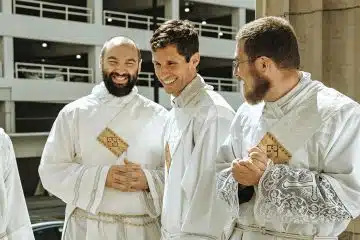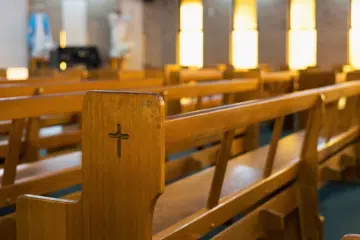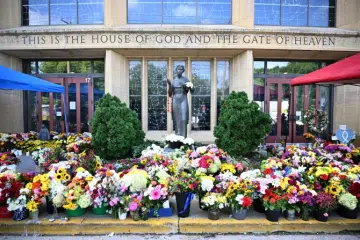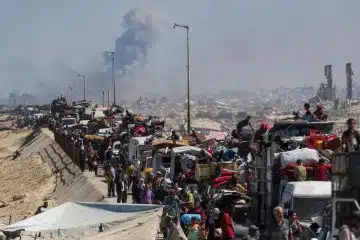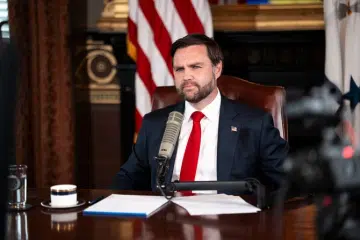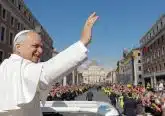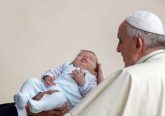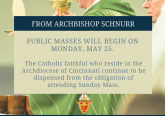Archbishop Schnurr’s World Day Peace Message
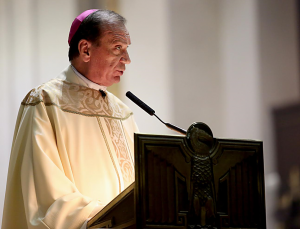
Conflict is a natural part of what it means to be human. Until God ushers in His Kingdom, we know that we will be muddling our way, creating and overcoming conflicts.
The Church, for instance, will unapologetically stand up for the principles we believe in. We will witness to our concerns for the unborn, the immigrant, our religious liberty, the poor and vulnerable, and care for the Earth. And this will most certainly mean that we will find ourselves in conflict with those who see things differently. How can we not stand up for the life and dignity of ourselves and others without bringing on conflict?
Conflict that spirals into violence, however, is a human failure. It is a rejection of God’s Kingdom. As St. John Paul II once warned, “Violence is a lie, for it goes against the truth of our faith, the truth of our humanity” (Homily, Apostolic Journey to Ireland, 1979).
And, sadly, violence permeates our lives. Hostility can invade our families, certainly through physical abuse and neglect, but also emotionally through indifference to each other and hurtful communication. Among some faith communities, religious extremists aspire to terrorize us through unthinkable bloodshed. And a reactionary distrust of entire faith traditions and the vast majority of their peaceful followers divides humanity against itself even further. In our cities, racial attacks among white, black and immigrant populations uncover that, even in the 21st century, America still has a long way to go before we achieve racial healing. Our nation remains battered and bruised by one of the most ideologically divisive elections in recent memory.
From the bombardments in Syria to standoffs with China, our globe is rife with war, terrorism, and heating tensions among world powers. And the Earth itself, while gifted to us for human life and flourishing, [the Earth itself] cries out from our lack of care and overuse of resources.
All these examples speak of our failing to deal with our difficulties appropriately. All sides might believe that they have something worth fighting for. Yet, HOW we address our conflicts is clearly just as important as the subject matters behind them. Hence, Pope Francis states in his Message for this World Day of Peace, “conflicts have to be resolved not by force but by dialogue, respect, concern for the good of the other, mercy and forgiveness”.
Is this because our faith is weak and spineless? Of course not! It is because we follow a God who is Love, and that means that acts of love are the strongest force! Whether for selfish or noble ends, violence never fully achieves the justice we seek. We cannot beat the heart of the wrongdoer into submission and expect true love in return. Love can only be freely returned –
and is it not love that we are ultimately seeking? St. Paul reminds us of this in our Second Reading. He celebrates that our God of Love does not want to force His will upon us like “slaves,” but He invites us to freely say “yes” to His Kingdom as “heirs.” And so, not only do we believe that the ends can never justify the means, but we also believe the means are ends in themselves!
Let us allow the Christmas season to illustrate all this for us. Simply marvel, if you will, at just how God chose to reveal Himself through His Son. Our Lord, for example, could have afforded a comfortable, restful existence in any serene moment of history. Yet, to the contrary, Jesus Christ was born in a lowly manger, to a family who would soon become refugees, amidst a Jewish people occupied by brutal Roman authorities. God craved to take on human flesh in the midst of friction and turmoil.
Now, consider that this Messiah could have arrived, as many at the time had hoped, as a great warrior who would swiftly restore dignity to His Chosen People. Instead, the Son of God introduced himself to the world as a fragile baby one quiet night in Bethlehem. Moreover, even this entrance into the world would depend completely upon the leap of faith of a young virgin to first say “yes” to carry Him. Nothing about Christmas was forced.
As she pondered her newborn child, we are told in the Gospel that Mary “kept all these things, reflecting on them in her heart.” She, our Queen of Peace, must have realized that God’s plan would seamlessly unfurl from these radically nonviolent beginnings. Lying so helplessly in that manger, her son already made it clear to her that He would not practice any other tactic than to proclaim the Kingdom with love and mercy.
Throughout the rest of His earthly existence, this Jesus would never wield any weapons. Through love and forgiveness, He would instill God’s Kingdom in the hearts of those considered enemies. And, even sin and death would be conquered when He handed His life over to those who ruled by the sword. He did not respond with equal aggression. As Pope Francis exclaims, “Jesus marked out the path of nonviolence. He walked that path to the very end, to the cross, whereby He became our peace and put an end to hostility” (no.3).
And, so, today, let us face violent times with the same aspirations to nonviolence as our Savior. As Pope Benedict XVI once observed, “There is too much violence, too much injustice, and… this situation cannot be overcome except by countering it with more love, with more goodness. This ‘more’,” he recognized, “comes from God” (Angelus, Feb. 18, 2007). Let us, together, be this “more.” Let us deal with conflict as much as we can through civility, through clearly being able to articulate our convictions while being open to learn more, and through a compassion that always sees God in the other.
Pope Francis helps us in his World Peace Message by highlighting the heroic contributions of peacemakers who stared down evil with a decisive force of love and goodness. They include St. Mother Teresa in her unyielding defense for human life and the poor, Mahatma Gandhi in winning the liberation of India, Dr. Martin Luther King, Jr. in overcoming segregation, and St. John Paul II in facilitating the fall of communism. They showed us that nonviolence is not a sleepwalk through life. Rather, it is an earnest struggle for the reign of God, waged with the courage to love even our enemies.
Likewise, in this Archdiocese, we celebrate the many ministries that promote nonviolent solutions to our many critical concerns. Turning to those who participated in the pre-opening procession…] To our friends and special guests who join us today, please know that you have the appreciation of the local Catholic community for the examples you give us. May we all learn from and magnify your work.
I pray that we infuse 2017 with more love, with more goodness at all levels of human relations. This can be our humble way to respond as Mary did, saying “yes” to deliver to the world the Prince of Peace. By following her perfect example, may we one day take our place among God’s blessed peacemakers.
May God bless all of us, our communities, and those we strive to serve [may He bless us] abundantly throughout the new year!
For more photos of the World Day of Peace Mass at St. Peter in Chains Cathedral, click here


